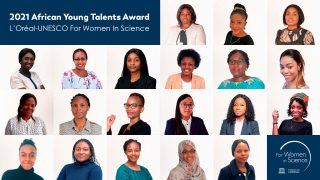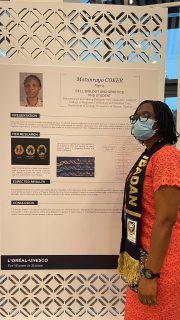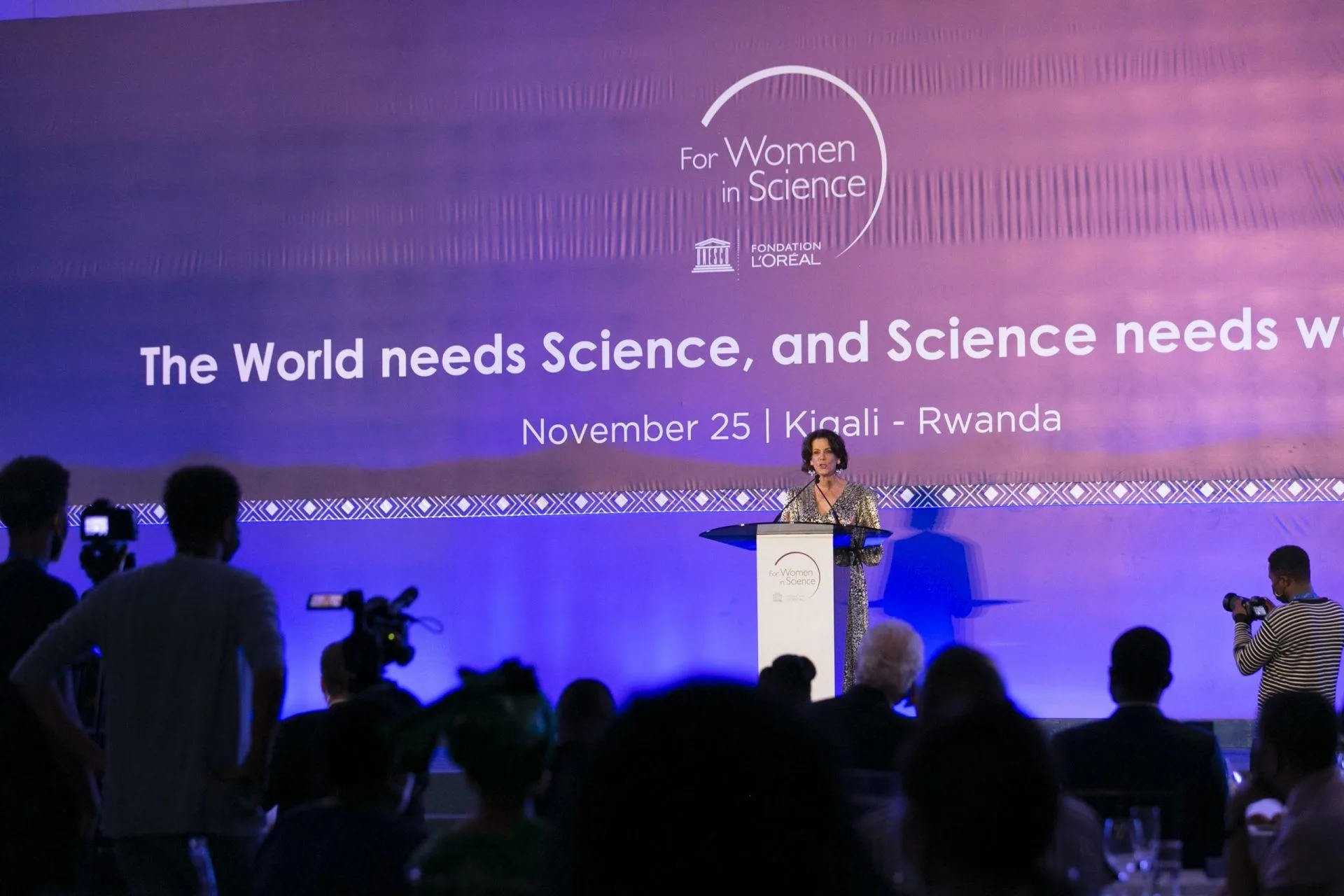Paris, November 26th, 2021 – The Fondation L’Oréal and UNESCO are revealing today the laureates of the 12th edition of the For Women in Science Young Talents Awards for Sub-Saharan Africa. This program rewards twenty young African women scientists for the excellence of their research. For the 2021 edition, the 15 PhD students and 5 postdoctoral students awardees come from 17 countries and embody, through their backgrounds and research topics, all the diversity and potential of African science for today and tomorrow.
AFRICAN WOMEN IN SCIENCE – KEY PLAYERS IN THE DEVELOPMENT OF THE CONTINENT
The Jury of the L’Oréal-UNESCO For Women in Science Sub-Saharan Africa Young Talents Awards 2021, chaired by Pr Aggrey Ambali, Director of Technical Cooperation and Program Financing at the African Union Development Agency (AUDA-NEPAD), selected these 20 Young Talents among nearly 440 applications. For the first time since the inception of the Awards, young talents from Eswatini (formerly Swaziland) and Gabon are present in the final list of awardees. 
Once again, the Young Talents from this year testify to the fact that African women scientists are a critical asset for the development of the continent. Driven by their commitment, they stand out for their excellence in their respective fields: from chemistry to virology, biology, neurology, and nuclear physics. Through their research, they make an important contribution to improving the living conditions of millions of people throughout Africa and the world.
During the Young Talents Awards ceremony held in Kigali, Rwanda, on November 25th, they were awarded in front of a high-level audience from all over Africa, including representatives of the scientific world and public authorities, intellectuals, opinion leaders, and organizations promoting gender equality.
Overcoming difficulties for women in science
These female scientists also have in common an exemplary determination that the obstacles they encounter cannot be affected. Some of these difficulties are inherent in the world of scientific research in sub-Saharan Africa. For example, the lack of financial and technical resources to carry out research, while other difficulties are specific to the fact of being a woman: social expectations that make it particularly difficult to find a balance between work and the role of a wife or mother. Finally, the lack of role models and, sometimes, the reluctance of some research directors to employ women are additional challenges they need to overcome.
 As a result, women are still largely underrepresented in the global research community: only 33% of researchers worldwide are women, and the percentage of African women scientists among worldwide researchers is 2.6%.
As a result, women are still largely underrepresented in the global research community: only 33% of researchers worldwide are women, and the percentage of African women scientists among worldwide researchers is 2.6%.
“Today more than ever, the world needs science, and science needs women, and this is especially true for Sub-Saharan Africa. Why should we deprive ourselves of such talents, when science and innovation are indispensable growth levers for the continent?”, declares Alexandra Palt, Executive Vice-President of the Fondation L’Oréal.
THE SUB-SAHARAN AFRICA YOUNG TALENTS 2021 AWARDEES
These 20 Young Talents 2021 are joining a community of 3,900 female researchers at PhD and postdoctoral levels who have been supported and honoured in over 110 countries around the world by the For Women in Science program since its inception in 1998.
Thanks to these regional awards, young women researchers receive financial support to encourage them to pursue their research projects (endowments of €10,000 for Ph.D. students and €15,000 for postdoctoral students). They benefit from training series (management, negotiation, public speaking…) aimed at providing them with more means to break the glass ceiling, as well as press and digital support through a visibility campaign to shed light on their profiles and inspire future generations of women researchers.
“We need role models for women and girl scientists, and we need to put the spotlight on the critically important scientific work done by female researchers around the world. Our aim is to change the discriminatory trends they are facing, urgently and together!”, says Shamila Nair-Bedouelle, Assistant Director-General for Natural Sciences of UNESCO.
About the Sub-Saharan Africa Young Talents Awards
Since the creation of the Sub-Saharan Africa regional For Women in Science program in 2010, L’Oréal and UNESCO have shed light on 161 outstanding women scientists, including 13 laureates of the International For Women in Science Awards and 134 young talents at Ph.D. and postdoctoral levels. Since 2019, South Africa also has a specific program supporting 7 young women researchers (5 PhD and 2 postdoctoral students) each year.
About the Fondation L’Oréal
The Fondation L’Oréal supports and empowers women to shape their future and make a difference in society, focusing on three major areas: scientific research and inclusive beauty and climate action.
Since 1998, the L’Oréal-UNESCO For Women in Science program has worked to empower more women scientists to overcome barriers to progression and participate in solving the great challenges of our time, for the benefit of all. For 23 years, it has supported more than 3,900 female researchers from over 110 countries, rewarding scientific excellence and inspiring younger generations of women to pursue science as a career.
Helping vulnerable women
Convinced that beauty contributes to the process of rebuilding lives, the Fondation L’Oréal helps vulnerable women to improve their self-esteem through free beauty and wellness treatments. It also enables underprivileged women to gain access to employment with dedicated vocational beauty training. On average, around 16,000 people have access to these free treatments every year and more than 18,000 people have taken part in professional beauty training, since the beginning of the program.
Finally, women are affected by persistent gender-based discrimination and inequalities, exacerbated by climate change. While they are on the frontline of the crisis, they remain under-represented in climate decision-making. The Women and Climate program of the Fondation L’Oréal supports, in particular, women who are developing climate action projects addressing the urgent climate crisis and raises awareness of the importance of gender-sensitive climate solutions.
About UNESCO
Since its creation in 1945, UNESCO, the United Nations Educational, Scientific and Cultural Organization, has worked to create the conditions for dialogue among civilizations, cultures, and peoples, based on respect for common values. UNESCO’s mission is to contribute to the building of peace, the eradication of poverty, sustainable development, and intercultural dialogue through its unique expertise in education, science, culture, communication, and information. The Organization has two global priorities: Africa and gender equality.
UNESCO is the only UN specialized agency with a specific mandate in the sciences, symbolized by the “S” in its acronym. Through its science-related programs, UNESCO contributes to the implementation of the United Nations Sustainable Development Goals, helps developing countries build their scientific and technological capacities, and supports the Member States in their efforts to develop science policies and programs. It also supports the Member States in their efforts to develop effective public policies that integrate local and indigenous knowledge systems.
Scientific advancements
UNESCO promotes scientific research and expertise in developing countries. The Organization leads several intergovernmental programs on sustainable management of freshwater, ocean, and terrestrial resources, biodiversity conservation, and the use of science to address climate change and disaster risk reduction.
With its national and regional offices on all continents, UNESCO supports international scientific cooperation and works with many partners at the global, regional, and national levels. Through its partners, the Organization can draw on resources, know-how and expertise to promote its ideals and values and to strengthen the impact and visibility of its action in all its fields of competence.
|
Follow the programme on Twitter @4womeninScience |



![women [longevity live]](https://longevitylive.com/wp-content/uploads/2020/01/photo-of-women-walking-down-the-street-1116984-100x100.jpg)










